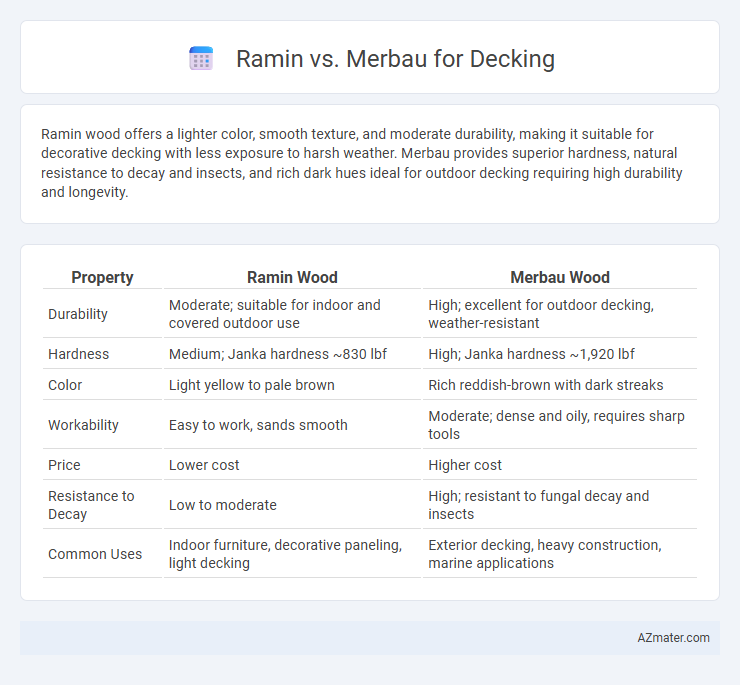Ramin wood offers a lighter color, smooth texture, and moderate durability, making it suitable for decorative decking with less exposure to harsh weather. Merbau provides superior hardness, natural resistance to decay and insects, and rich dark hues ideal for outdoor decking requiring high durability and longevity.
Table of Comparison
| Property | Ramin Wood | Merbau Wood |
|---|---|---|
| Durability | Moderate; suitable for indoor and covered outdoor use | High; excellent for outdoor decking, weather-resistant |
| Hardness | Medium; Janka hardness ~830 lbf | High; Janka hardness ~1,920 lbf |
| Color | Light yellow to pale brown | Rich reddish-brown with dark streaks |
| Workability | Easy to work, sands smooth | Moderate; dense and oily, requires sharp tools |
| Price | Lower cost | Higher cost |
| Resistance to Decay | Low to moderate | High; resistant to fungal decay and insects |
| Common Uses | Indoor furniture, decorative paneling, light decking | Exterior decking, heavy construction, marine applications |
Introduction to Ramin and Merbau Wood
Ramin is a lightweight, pale hardwood native to Southeast Asia, prized for its fine texture and ease of finishing, making it ideal for decking applications requiring smooth surfaces and detailed craftsmanship. Merbau, a dense, dark hardwood from Southeast Asian rainforests, offers exceptional durability and natural resistance to decay and insects, ensuring long-lasting outdoor decking performance. Both woods vary significantly in hardness and visual appeal, with Ramin providing a softer, brighter option and Merbau delivering robust strength and rich color.
Origin and Botanical Profile
Ramin (Gonystylus spp.) originates from Southeast Asia, primarily Malaysia and Indonesia, and belongs to the Thymelaeaceae family, known for its fine texture and uniform pale yellow to light brown color. Merbau (Intsia bijuga), native to the equatorial rainforests of Southeast Asia and the Western Pacific, is part of the Fabaceae family, characterized by its dense grain and rich reddish-brown hue with occasional darker streaks. Both species are valued in decking for durability and resistance, but their distinct botanical classifications influence their growth patterns and wood properties.
Appearance and Color Differences
Ramin decking features a light, cream to pale yellow color with a smooth, uniform grain, offering a clean and subtle aesthetic suitable for modern designs. Merbau presents a richer, darker hue ranging from reddish-brown to deep chestnut, often with contrasting golden highlights that enhance its natural warmth and visual depth. The color stability of Ramin tends to remain consistent over time, while Merbau's vibrant tones may deepen further with exposure, providing a more dynamic appearance.
Durability and Lifespan Comparison
Ramin wood offers moderate durability and typically lasts 10 to 15 years for decking applications, making it suitable for sheltered or low-exposure areas. Merbau, classified as a highly durable hardwood, can withstand extreme weather conditions with a lifespan exceeding 25 years when properly maintained. The natural oils and dense grain of Merbau enhance its resistance to rot, insects, and decay, giving it a significant advantage over Ramin in long-term decking performance.
Resistance to Weather and Pests
Ramin wood exhibits moderate resistance to weather but is less durable against pests compared to Merbau, which is highly resistant to both weather elements and termite infestations. Merbau's dense grain structure and natural oils provide superior protection, making it ideal for outdoor decking in harsh climates. Choosing Merbau ensures longer-lasting performance with minimal maintenance in environments prone to moisture and insect damage.
Sustainability and Environmental Impact
Ramin decking comes from fast-growing forests, often certified by the Forest Stewardship Council (FSC), making it a more sustainable choice than Merbau, which is typically harvested from slow-growing tropical rainforests with higher ecological risk. Merbau's extraction contributes to significant deforestation and habitat loss, impacting biodiversity negatively, whereas Ramin's plantation-based supply chains reduce environmental degradation. Choosing Ramin over Merbau supports better forest management practices and lowers the carbon footprint associated with decking material production.
Price and Availability
Ramin decking offers a more affordable option compared to Merbau, with prices typically ranging from $15 to $25 per square foot, while Merbau can cost between $20 and $35 per square foot due to its higher density and durability. Ramin is widely available in Southeast Asia and imports are easier to source through major timber suppliers, making it more accessible for budget-sensitive projects. Merbau's availability is more limited due to sustainable harvesting restrictions, which can increase lead times and prices in international markets.
Maintenance and Care Requirements
Ramin decking demands minimal maintenance due to its natural resistance to pests and rot, requiring only periodic cleaning and occasional sealing to maintain its appearance. Merbau, on the other hand, is more prone to surface wear and weathering, necessitating regular oiling and refinishing to prevent cracking, fading, and insect damage. Both woods benefit from proper ventilation and moisture control to extend their lifespan, but Ramin's maintenance routine is generally less intensive and more cost-effective over time.
Ideal Applications for Decking
Ramin decking is ideal for light to moderate traffic areas such as residential patios and garden pathways due to its fine texture, uniform grain, and moderate durability. Merbau, with its dense, oily hardwood properties and high resistance to decay and termites, excels in high-traffic outdoor applications like commercial decking, boardwalks, and pool surrounds where durability and weather resistance are critical. The natural oily characteristic of Merbau also provides excellent slip resistance, making it a preferred choice for safety-conscious decking environments.
Ramin vs Merbau: Final Recommendation
Ramin offers a lightweight, pale hardwood with moderate durability, ideal for budget-friendly decking in low to medium traffic areas. Merbau provides superior strength, dense grain, and exceptional resistance to weather and insect attacks, making it highly suitable for high-traffic, outdoor environments requiring long-lasting performance. For ultimate decking longevity and premium quality, Merbau is the recommended choice, while Ramin serves well for economical and decorative applications.

Infographic: Ramin vs Merbau for Decking
 azmater.com
azmater.com